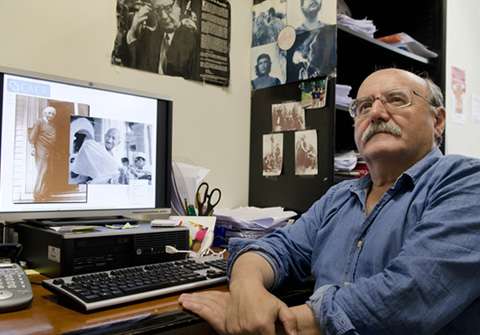Einstein and Hitler, the hero and the villain of world history

What do Einstein, Mother Teresa, Gandhi, Martin Luther King Jr., Newton, Jesus, Mandela, Edison, Lincoln and the Buddha all have in common? They all make up the top 10 heroes in world history. As regards the villains, the first 10 positions are occupied by Adolf Hitler, Osama bin Laden, Saddam Hussein, George W. Bush, Stalin, Mao, Lenin, Genghis Khan, Saladin, the emperor Qin and Napoleon.
This classification into heroes and villains is the result of a study carried out jointly across the world by various universities, including the UPV/EHU-University of the Basque Country. 6,902 university students voluntarily participated in this international research; their average age was 23 and they were drawn from 37 countries, such as Argentina, Australia, Pakistan, South Korea, USA, India, Tunisia, Italy, Japan. The work was based on the evaluation that these young adults have made of 40 figures and significant events in world history. The results of the evaluation have been published in the Plos One scientific journal and assert that historical figures help to create the base for building the transmission of moral lessons and that the facts constitute ways of acting.
"This study is linked to a previous piece of work carried out in 30 countries and in which young adults were asked to name the most important figures and events in world history. After that, we got together a group of figures and events gathered by all cultures, although with a reduced presence of facts and personalities from Arab and African cultures, as there were fewer surveys from these cultural areas," explained Darío Páez, a lecturer in the UPV/EHU's Department of Social Psychology and Methodology of Behavioural Sciences of the Faculty of Psychology.
There is greater disparity of opinion about the villains
The university students had to rate on a scale from 1 to 7 how positive and how negative the events and figures presented were. This study has produced a significant piece of data: regarding the negative events, there is clear consensus as to which the negative ones in world history are. But this consensus does not emerge when we are talking about historical figures. "There is greater disparity of opinion about the villains. The same figure may be very negatively rated in one country, or not very negatively or even very positively in another part of the world. That would be the case of Osama bin Laden, for example".
Another significant piece of data displayed by this research is that "when the surveyees were asked to respond spontaneously about who the most important figures in history were, names of political or military leaders were given because the things that occurred to the students were wars, conflicts and power struggles. But when the questions were closed ones and they sat down to think about them, the same students attached greater importance to scientists and other humanitarian figures. Likewise, when we asked about historical events, facts with a long time span such as the industrial revolution, the French revolution or the development of science were regarded as important as or more than wars".
Political, Machiavellian or pragmatic realists
A strange thing about the work is that it confirmed the tendency of a group of people in the sample analysed to evaluate 'heroes' positively but not to denigrate the 'villains'. "They are those people defined as political, Machiavellian or pragmatic realists and when one considers that Hitler, Stalin or Saddam Hussein wielded power at some moment, these individuals don't have to be rated negatively because they were successful in their struggle for power. This "Confucian" view emerges strongly in Asian countries," says Prof Darío Páez.
The cultural inheritance received since childhood and throughout our lives influences the view we have of History, according to this researcher. "Above all, this variability is shown in the 'villains' because there is a certain cultural consensus on the 'heroes' suggested in this study; most of them agree that Einstein and Mandela are heroes. For example, the view of Osama bin Laden is more positive in Arab culture, and that of George W. Bush is much more negative and, conversely, if one takes American culture into consideration".
So the results obtained in this study conducted across the world confirm that there is fairly clear consensus between the different cultures as to who the 'heroes' in world history are, but there is much greater discrepancy about who the 'villains' are. "The heroes are clearly scientists, discoverers and people who fought for liberties and progress. By contrast, the differentiation among the villains is much greater. Even if in almost all cultures the top villain, the worst rated, is Hitler, there is variability in some cultures in which he is evaluated less negatively, above all among the more recent villains like Saddam Hussein, Osama bin Laden or George W. Bush, the latter being clear proof of the loss of symbolic power of American society worldwide," concluded Darío Páez.
More information: Hanke K, Liu JH, Sibley CG, Paez D, Gaines SO, Moloney G, et al. (2015) "Heroes" and "Villains" of World History across Cultures. PLoS ONE 10(2): e0115641. DOI: 10.1371/journal. pone.0115641
Journal information: PLoS ONE
Provided by University of the Basque Country

















